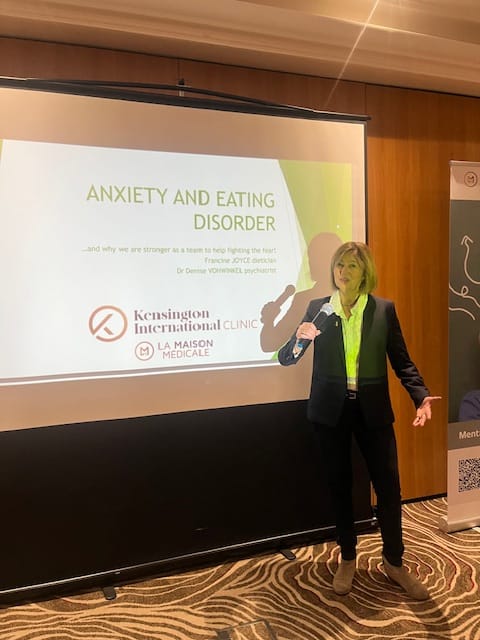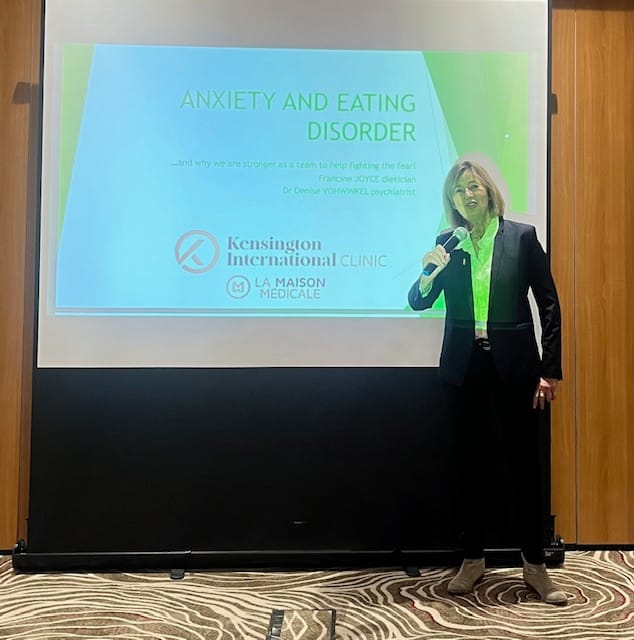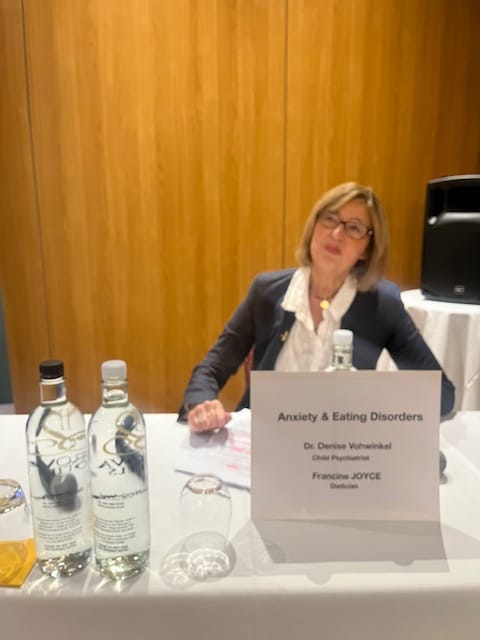
Anxiety and Eating Disorders
In any pathology, nutrition is often the most obvious symptom, the one that hides another issue.
It is either a sign of anxiety or a cause of anxiety
Nutrition issues (eating disorders) are not always easily nor immediately visible.
Patients – whatever their age – develop many very clever strategies to hide their problem (teenagers will wear oversize clothes, dull colours, hoodies ; they will avoid bright colours - NO Barbie pink NO Ferrari red ; they will find excuses to eat separately, in their bedroom…)
SIGNS OF AN ANXIETY - LINKED EATING DISORDER
The visible aspects of an eating disorder will generally includethe following :
- A change in weight (eating too much or not enough will depend on the patient’s strategy)
- A change of appetite which they will hide as much as possible to avoid questions and family tensions
- Problems of concentration which may show in declining school results. As a matter of fact, for the body, vital functions are more important than intellectual ones. It will preferably use its energy-supplies to make the heart beat rather than help with intellectual functions like thinking, memorizing, concentrating These difficulties will increase anxiety
- Changes of attitude : they will start cooking their own meals to control quantities and ingredients, they will prefer to eat their meals separately, they will introduce specific food restrictions ( they will reduced carbs, fatty acids like oil and butter ; they will start counting calories
Restrictions will reassure the patients but will also be a cause of stress as they will feel that portions are always too much, that they could always eat less ;
They will spend hours on Tik Tok and compare themselves with others which again, will be another source of anxiety.
and last but not least, they will confuse everybody with very brutal mood swings !
Recognisable symptoms of anxiety linked to an eating disorder
Patients will experience unpleasant physical symptoms, and will complain about them …
Parents should see those as alarming signs, for example :
- They will express feelings of increasing tiredness which is logical, as their poor nutrition will deplete their energy levels ,
- bloating (because of their wrong food choices),
- cramps (from anxiety or hunger),
- have progressive enzyme deficiencies with increasing difficulties to metabolise proteins, or lipids… which will cause further digestive discomfort,
- This will also trigger changes in their microbiome causing a possible dysbiosis
NUTRITION AS A LANGUAGE TO EXPRESS ANXIETY
All of this, is very difficult to articulate and express with words.

Words can be too painful to express (as they refer to a possible painful event, or an unpleasant reality …)
When nutrition is an expression of anxiety
Sometimes the emotions they refer to have been bottled in too long … they become unconscious and cannot be expressed with language
Food then becomes a language, a means of expression and communication :
- they starve to disappear and not be a target any more ;
- OR they binge to protect themselves - using extra weight as an armour – like a physical protection
And if it works, it becomes addictive : they feel they regain some kind of control over their lives : People start complimenting them “wow ! you look lovely in that dress size 8 !”. They then eat less and less OR more and more. It makes them feel less vulnerable, less fragile, more imposing or more transparent ; feeling invisible makes them feel protected from judgement and negative comments.
Worse … they may eat more and more to fill an emotional void. They feel guilty about that hyperphagia and sometimes make themselves vomit. They might also use laxatives …
And the fear of being discovered is another huge source of anxiety

CONSEQUENCES
PHYSICAL CONSEQUENCES OF ANXIETY AND DISBALANCED NUTRITION

Physical consequences may include
- weightloss or weightgain
- deficiencies in macro and micronutrients
- cardiac issues (arythmias, heart muscle thining, low heartbeat ...)
- reduced immunity
- hormonal issues, periods disappearing (amenorrhea)
- tiredness
- digestive discomfort (hunger, nausea, constipation, bloating, cramps, difficulties to absorb nutrients ...)
- dry skin
- hair loss
PSYCHOLOGICAL CONSEQUENCES
Psychological consequences are constant, daily, obsessional, and a daily torture
The patients WANT to get better,
they want to stop vomiting,
they want have a normal social life,
they want to get periods back
BUT
They are not confident enough to get back to a healthier life and face their fears
This ambivalence becomes a huge source of anxiety.
They start developing body image issues, they have a distorted vision of themselves. In anorexia they see themselves much bigger than they are
Their distress is due to these ambivalent feelings and it may well lead to depression.
The way out is opening up to somebody NEUTRAL ; somebody not emotionally involved like parents (children and teens will be scared of their reactions, will not want to hurt or disappoint them ).
That is when the psychology team comes in !
The aim of the dietician is to restore the patients’ physical health, help them rediscover food as an ally
The psychiatrist and the psychology team will help them restore their self-confidence and mental health




